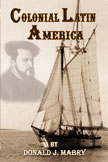Las Casas, Bartolomé de (revised)
© 2001 Donald J. Mabry
Bartolomé de Las Casas was a conquistador and a Dominican monk. He
did well in the New World, growing wealthy, but in 1514, at the age of forty, he
became upset at the treatment of the Indians and their death rate. He gave up his
repartimiento of Indians and went to Spain in 1515. He campaigned against the bad
treatment of Indians until his death in 1566, when he was more than ninety years old. He
became a Dominican in 1522. Bartolomé de las Casas' figures on the numbers killed were polemics;
he was not trying to be objective. How many were killed in battle? Not many. Most of them gave up.
Las Casas was sent from Spain to Española with Hieronymite friars
who were to govern the colony. Las Casas soon began protesting the fact that the friars
listened to the colonists regarding the Indians, the very people who were abusing them. He
had to take refuge in the Dominican monastery. He went back to Spain in 1517 where he
continued his lobbying campaign for three years. As a result, the Crown did accept
principle of Las Casas that Indians were human and could be Christianized and that it was
improper to enslave them or hurt them. Decision that Indians could not be enslaved
important. Had been arguments back and forth. Actual conditions of Indians varied a great
deal. As a result of the slave decision, had some legal recourse. It meant something in
slowing down the abuse of the Indians. Meant that the Church had some legal basis with
which to protect the Indians. However, the Indians didn't enjoy actual freedom.
Upper class didn't listen to Las Casas. They hated what he was
trying to do. They were trying to establish status and families, exploiting the Indians to
do it. They believed that what they were doing was right, proper, and necessary. The
Spanish used the Church to control the Indians, using it as an adjunct to other powers and
bodies. Las Casas was a thorn in the sides of both the Crown and the church.
He argued that the Spanish should attempt to pacify the Indians without killing them.
Tried this policy in central America in the late 1530s but the upper class was not
interested. he became bishop of Chiapas (now in Mexico) in 1543, countered the
wishes of the Spanish, and was back in Spain by 1547.
Las Casas wrote A Brief Account of the Destruction of the
Indies, a polemical and not entirely truthful work, trying to prove that the reason
the Indians were dying in such extraordinary numbers was because of Spanish mistreatment.
He argued that Spanish peasants should be imported to do the work but he couldn't keep the
ones he imported on the land. They, too, wanted to raise their status. The older
upper class wanted these people to be part of the upper minority elite that ran the
colonies. The whole enterprise in Venezuela in 1520-1521 with Spanish peasants who were
supposed the Christianize the Indians peacefully failed.
Las Casas put pressure on Crown and the New Laws (1542) were partly
the result of the work of Las Casas. Purpose of the New Laws was to extinguish the
encomienda system. Couldn't be applied. Royal officials in the colonies said "obezco
pero no cumplo" (I obey your order but I am not going to carry it out).
The Black Legend
Las Casas' efforts helped give rise to the Black Legend about Spain,
that the Spanish were unusually cruel. The term was invented in 1900 by a Spaniard to describe foreign, especially Anglo and
American, attitudes toward Spain. Hispanic people felt threatened by non-Hispanic people.
Spanish American War. Intrusion of modern economy and politics.
_______________________________
Freide, Juan and Keen, Benjamin, eds. Bartolomé de las Casas in History: Toward an
Understanding of the Man and His Work. DeKalb: Northern Illinois University Press, 1971.
Las Casas, Bartólome. A Short Account of the Destruction of Indies. New York, Penguin, 1999.
____________________
To read more about colonial Latin America, buy and read

Colonial Latin America by Don Mabry.
You can read another biography on this server as well. See Man Who Made a Difference

